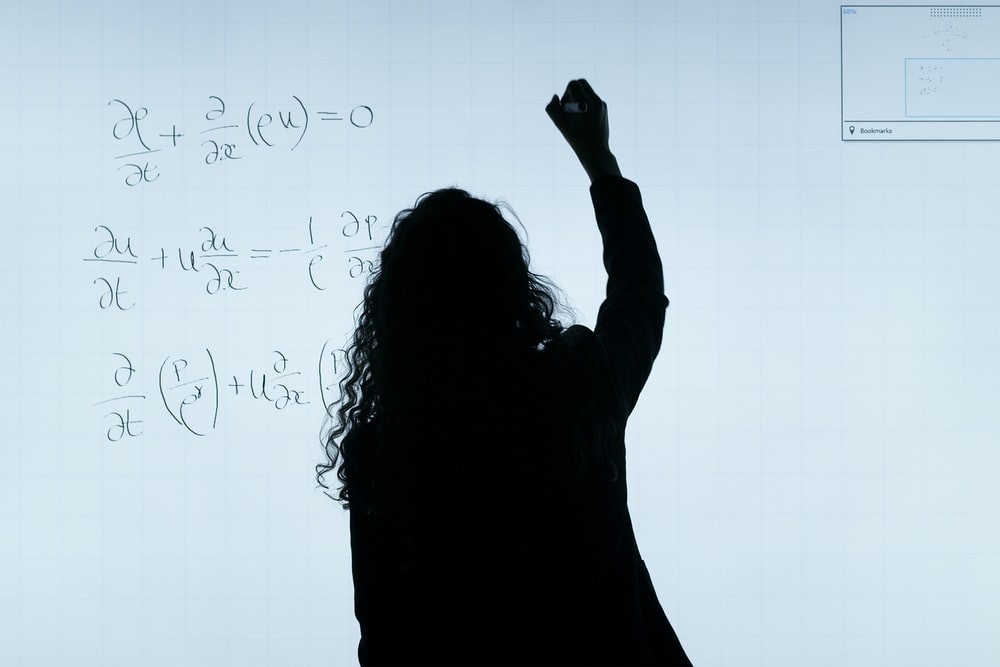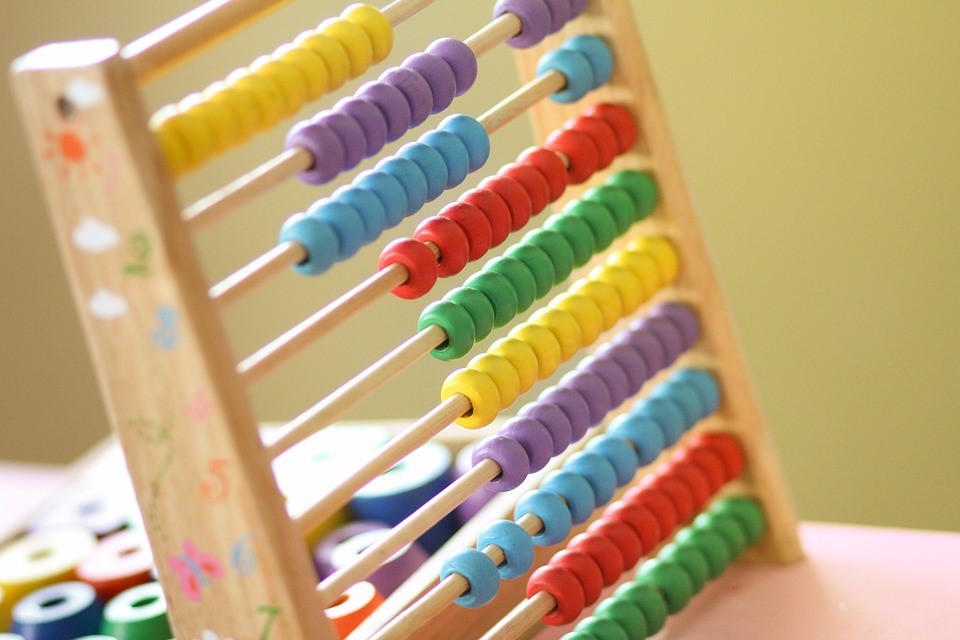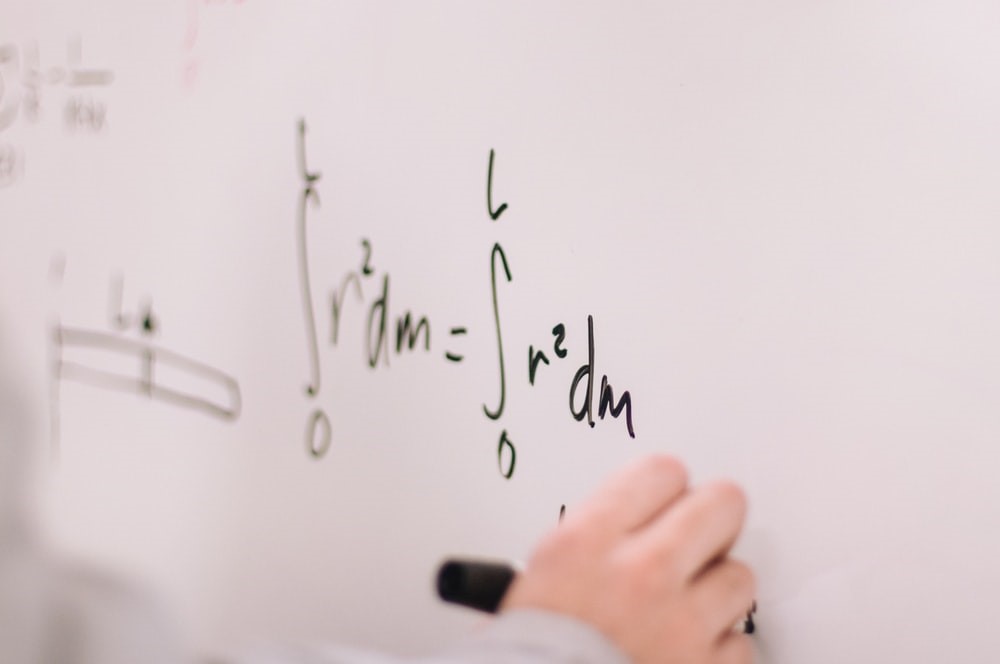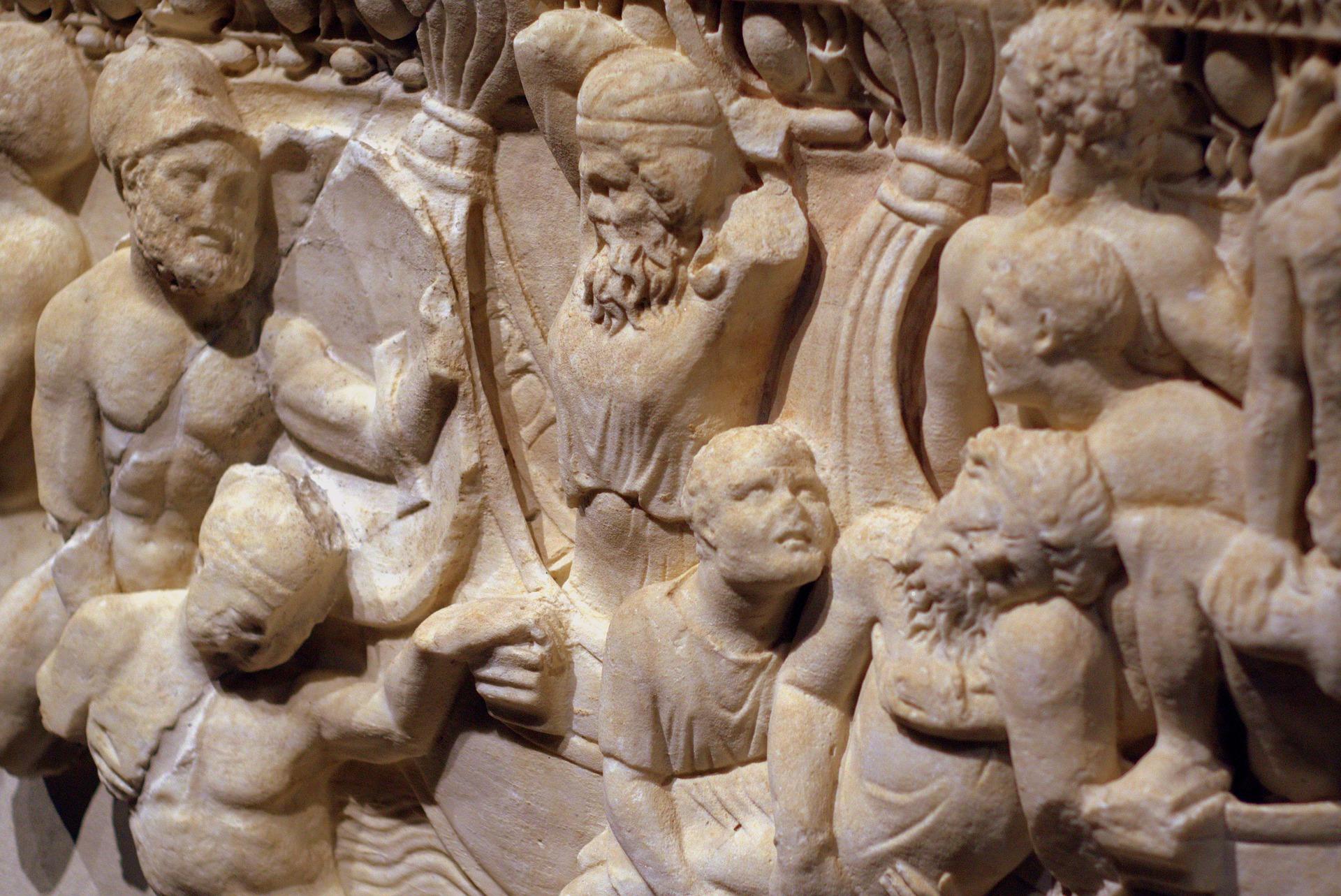Looking at all aspects of Maths teaching begs the question: how was maths taught in the time of Plato and beyond?
Want to give private lessons?
Join the Superprof community and share your knowledge with interested and motivated students.
Maths Background In Ancient Greece
Education in general varied widely from state to state. Spartans placed great emphasis on morality while Athenians focused on graceful perfection of the physical and mental forms.
The study of Mathematics was taught very differently than today, mainly because Geometry and Arithmetic were separate subjects. The concept of Arithmetic was further broken down into calculations, which was taught to artisans and others of middle-class status.
Those who had time, money, and inclination could pursue further studies into the science of numbers.
Sons started their education at home, under the guidance of a parent or an in-person or online math tutor for kids. Early education included Letters, Music, and Gymnastics, but little to no Arithmetic or Geometry.
Around age twelve, students enrolled in maths lessons, where they furthered their learning in Grammar, Logic , and Rhetoric.
Those from working-class families generally ended their formal schooling at that point, but those students from high society would matriculate at colleges or academies set up by Plato, Pythagoras or Aristotle.
Pythagoras founded a school in 514 BCE. We owe much of our knowledge of geometry to studies made at that institution.
From the consideration of perfect, abundant, and square numbers and their properties came the idea that everything in the universe can be expressed mathematically.
Thanks in part to those studies, music came to be considered a mathematical science.
Plato's Academy lasted over nine hundred years. Meant to develop future statesmen, Plato's views on Mathematics were far more limited than Pythagoras'. He acknowledged that training in Maths led to clear, logical thinking, an attribute prized by politicians of the day.
He proposed that a student should study maths only during the first ten years of his education in order to best transition into the type of rational, philosophical thinking needed to succeed in politics.
His Academy was deemed a 'pagan' establishment and was shut down by Emperor Justinian in 529 CE.
Further evidence of Roman control over Plato's teachings is evident in The Republic, wherein he avers that only elementary learning of Mathematics is necessary.
Check the latest private maths tutoring rates here.

Maths Teaching In Ancient Rome
As did the Greeks, so did the Romans: early education at home, only for boys. Students engaged in formal maths learning around age twelve and studied Letters, Music, and elementary Arithmetic, using their fingers and abaci.
Unless called for by social status or profession, scholars in Rome did not engage in further maths studies outside of what they learned at home.
Those who could apply themselves further attended lessons given by a Mathematics Master. Instances of such were rare, the exception rather than the rule of Roman scholarship.
Surviving documents from the period seem to indicate that Maths teaching was not wholly welcome or accepted but seen as necessary in some instances.
- Vetruvius suggested students of architecture study Optics, Astronomy, Law, Geometry, and Arithmetic
- Galen recommended future physicians study Medicine, Rhetoric, Music, Dialectics, Geometry, and Arithmetic
- Varro and Seneca also recommended the study of Geometry and Arithmetic, if only to improve or deepen logical thinking abilities.
In Ancient Rome, professions requiring Logic, Rhetoric, or Oratio were far more esteemed than those dealing with numbers and sciences. In fact, high society looked down on 'illiberals,' those who had careers requiring extensive maths (or science) knowledge.
Looking to brush up on your math skills? Find a math tutor near me on Superprof!
Because Of This Prevailing Attitude, The Teaching Of Maths Stalled For Centuries.
Cassiodorus, a 6th-century Roman statesman passionate about education, promoted the need for teaching to the Roman Catholic church. He categorized learning into two broad categories: Trivium, which dealt in speaking and languages, and Quadrivium: the study of Arithmetic, Geometry, Music and Astronomy.
That same division exists in today's educational parameters, only with different names: Humanities and Sciences, with the exception that modern-day educational philosophy treats music as an aspect of human culture rather than a science.
By the 9th century, most monasteries included schools, where new members of the priesthood received education. While the Trivium was wholly embraced, to learn Maths and sciences were only taught at the highest centers of teaching.
The school attached to the great Cathedral of York was one of the few institutions in England which taught Mathematics.
The Church became the driving force of education in Europe. Math instruction was unfortunately minimal.
However, with the resurgence of war, the focus shifted away from teaching altogether until Gerbert D'Aurillac discovered mathematical texts written by Boethius.
By the time Gerbert became Pope in 999 CE, he had written his own copy of Boethius' documents and proclaimed it essential teaching within the Church.
Maths teaching was in vogue and remained a core requirement in schools for five centuries.
During this time, across the world, great advances were made in the study of numbers and relations: interest computation, algebra, differential calculus, and factorization, among others. New advances were added to maths curriculum almost as soon as they were proven.
In Britain, a church movement separate from Roman Catholicism was gaining power. That body wished to rid itself of any association with 'pagan' ways and ideals. That meant that any Mathematics studies fell out of favor in this country.
Here is how to find maths tutees.

Want to give private lessons?
Join the Superprof community and share your knowledge with interested and motivated students.
The History Of Maths In The Renaissance Period
The Renaissance brought forth new ways of thinking about education. More than simply learning what one must to do their job, emphasis was placed on students learning life skills.
During this period, Euclid's Elements was translated into many languages and widely disseminated, thanks to the newly-invented printing press. That meant that maths scholars in Germany, France, and Italy were using the same materials to study, with or without teachers.
Learn to tutor maths successfully.
The Works Of More Modern Mathematicians Were Being Printed Too
In England, Robert Recorde wrote one of the first series of maths textbooks designed to give ordinary citizens a better understanding of addition, subtraction, and equations.
It was Recorde who gave us the '=' symbol. In formulating his texts, he reasoned there was nothing more equal than two parallel lines of the same length.
Mid-sixteenth century, Ramus proposed a return to the original seven liberal arts studies, but organizing them by three 'laws':
- only true and necessary facts may be included
- only facts belonging to the subject in question may be included
- general things must be dealt with generally; particular things particularly
He then proceeded to write entire textbooks on each subject.
Remus and Recorde's textbooks awakened an interest in Mathematics, not just in scholars and well-to-dos but among the middle class. As society's hunger for maths knowledge grew, private Maths Tutors were soon earning a comfortable living.
It Took A Bit Longer To Coordinate Advanced Maths Teaching In Schools
Upon graduation from Cambridge, John Dee proclaimed the need for improving maths in Education. Not that there was much practical or commercial use for maths at that point, but because of its ability to 'lift the heart to the heavens!' - reflecting Pythagoras' declaration of centuries before.
Despite assertions by Dee and others, universities maintained the Medieval Curriculum – teaching math, geometry, and astronomy only minimally, focusing on the Trivium.
The History Of Mathematics In The Nineteenth Century
Much focus was given to when and how a pupil should be taught maths:
Children should start learning basic Arithmetic as soon as they enter school, and their learning should be based on the perception of physical objects.
In spite of progressive thinking, many of Britain's schools were still very conservative. The foundation of the Analytical Society of Cambridge served to persuade that institution to embrace broader Maths studies. By 1823, differential calculus had made its way into the curriculum.
Soon, a new type of school opened, one where maths and other sciences were given pride of place.
The University of London would provide an education in Mathematics and Physical Sciences. The first chair of Mathematics was given to Augustus De Morgan, who revolutionized the way maths was taught.
After lecture, he would hand out test papers based on that day's lesson. The students were to return the completed exams, from which he would discern areas of understanding and where more explanation was needed. The next day's lecture incorporated what had not been grasped the previous day.
Discover the appropriate maths teacher wages for you.

Importance Of Math
It is a fact that most teenage students find math either unbearably boring or too difficult.
According to a Pew Research Center survey, 52% of people believe that teenagers don't indulge in STEM subjects because they are too hard for them.
Most of them think that math is not usable in the real world as it lacks relevance. They are right to an extent, as the majority of people haven't used quadratic equations in professional settings.
However, when learning what is the history of math, you will understand that its benefits are long-term and far more valuable and substantial. This is because the history of math goes a long way. It has been around for ages and is relevant in almost every profession.
Benefits Of Math
Despite math's rather boring nature, the study has tremendous benefits and helps individuals in different situations while performing numerous tasks.
Whether it is academics or general life, it is crucial to have a mind tuned to make sense of mathematical concepts. To better understand the benefits and importance of math, read on:
Analytical Thinking

Math enables us to develop analytical thinking, thanks to which we can understand abstract concepts by decomposing them to their origin and finding connections between their components. To put it simply, without analytical thinking, our minds are not capable of comprehending complex arguments and their conclusions.
When we try to solve a mathematical problem, our mind goes into analytical mode. First, we collect information, filter out relevant data, find the premise, and then identify relations. This approach allows us to use existing connections to find rational solutions.
Mathematical problems that we solve in classrooms enhance our analytical abilities and prepare our minds to address real-world issues. Therefore, smart people with a strong mathematical background and analytical skills encounter a problem; they find the best solutions between the alternatives by using logic and rationality.
Furthermore, analytical thinking allows us to find the most relevant information by understanding the meaning behind complex concepts — it encourages us to find solutions based on evidence and research.
Since we are looking to remove errors, it is not easy to manipulate or deceive us. Math allows us to find logical reasons in every aspect of life. We tend to analyze accurate, calculable, and verifiable data to reach decisions.
Learn everything you need to know with a professional math tutor near me.
Math Increases Wisdom
Since math allows us to understand concepts, we can learn and explain how things work. We can explain and express thoughts, ideas, and concepts with coherence, clarity, and confidence with proper understanding.
With this ability under our belt, we can create an impact with our capability to learn, think, and express. Consequently, people look up to us for clarity and information, putting us in an authoritative position. For Instance, parents try to learn more to clarify all doubts and concerns of their children.
In addition, math is applied in different sciences and encourages students to look for their convictions. This problem-solving nature creates an urge to find truth by adapting a logical approach.
Overall, doing math and solving complex problems challenges your brain to think smartly and critically. Like other parts of the body, the brain also requires training to enhance cognitive abilities. And there is no better workout to strengthen your brain than Math.
But remember to strengthen your basics before moving forward because these fundamentals will allow you to understand more complex concepts.
Financial Intelligence
If you are fortunate enough and make good money, it is integral to use your earnings wisely. With the help of math, you can get better at handling finances.
It goes without saying; without decent math knowledge, you lack financial intelligence. Because when you are not good with computations and calculations, the chances are that you may end up losing a lot of hard-earned cash.
On the other hand, being financially informed enables you to analyze different situations and narrow them down to the best-case scenario.
You evaluate all available information and take calculated decisions rather than going with a hunch.
Math Helps To Recognize Frauds
Most of the time, fraudulent schemes and financial scams are targeted towards uneducated, desperate, and not-so-smart people. Unfortunately, it is because they are naïve and can easily fall into a trap.
Since numbers leave them confused, they cannot make sense of complexities, and their judgment gets clouded by the so-called claimed benefits.
Having sound knowledge of stats, finance, and math, trains you to read between the lines. You delve in and look past the advertised benefits and focus on the numbers to see if all the made claims are achievable or not.
Math Is Fun

Most people agree on the fact that doing math is a fun activity rather than a boring task. With the right mindset and approach, solving mathematical exercises are like solving a fun puzzle.
The provided information serves as puzzle pieces, and with all parts, upfront, a clearer picture is painted.
That said, when you solve an equation, it gives a certain sense of satisfaction that is not any less than an achievement. Once you get the knack for it, you will be solving problems just for fun.
Math Helps Escape From Poverty
Math can be your ticket out of poverty. The world is changing, and the need for smart people is increasing. As a result, most high-performing students are opting for math and other sciences to break the cycle of poverty and compete with students of other countries.
Although globalization has introduced us to a variety of new challenges, at the same time, many new opportunities have come forth.
With math, the scope is broad and wide — tons of studies can be pursued if one is good at math.
Looking for a math tutor near me? Find one easily when you search on Superprof.
Math Is The Future

Math has been around for ages, and it seems like it will stay relevant for years to come. It has become a crucial factor in almost all industries, and every decision is made by considering quantitative aspects to evaluate alternatives.
Eventually, it is highly likely that the few decisions that we make based on emotions and purely qualitative data will also be replaced by rationality and calculation.
In years to follow, the success of a political candidate won't be based on emotions and values but by numbers and calculations — there will be less speaking and more analyzing.
Math Helps With Cooking
You read that right. Math indeed makes you a better cook. Contrary to common belief, math also helps in daily chores and routine activities like time management, organizing routines, and even cooking.
When you know math, you can quickly calculate the number of ingredients required for a particular number of servings.
For Instance, if the recipe is for four people and you need to serve eight guests, you can easily multiply all the ingredients by two so that the dish is double the size and enough for the guests. On the other hand, without math, you will have trouble cooking an adequate quantity of food. Sometimes you'll be cooking too much while sometimes not enough.
Hone your math skills with a personal math tutor near me on Superprof.
Math For Fitness
Like in all the other crucial departments, math is also considered useful when it comes to health and fitness.
This is because to improve your diet and fitness level; it is crucial to keep track of it. For instance, how many calories your body gets and how much exercise you need to burn calories.
Thanks to math, you can track how much food intake is required in order to achieve a certain body fat percentage.
Whether you are aiming for weight loss or muscle growth, math and fitness go hand in hand. Therefore, it is always a good idea to have better statistics on your workouts and fitness.
Need Help With Mathematics?
Although great advances have been made in the field of Mathematics, the art of teaching math at primary school, high school, and college-level remain essentially unchanged since De Morgan's time.
Even private tutoring of maths harkens back to ancient times, except now you can teach maths online.
Government and organizations have invested tremendous resources in developing teachers and teaching methods. Expanded common core maths curriculum includes the study of:
- Mathematical concepts
- Algebra
- Geometry
- Calculus
- Trigonometry
- The study of equations of all types: quadratic, linear, differential, parametric – among others.
The fact remains that it has always been teachers who, through their very love of the subject material, ignite a desire to understand and explore the exciting arena of maths.
Hopefully, we have covered sufficient knowledge to help students understand the importance of math and acknowledge its benefits. However, if you are still reluctant to solve math questions, we highly recommend getting professional help from expert math tutors near me with a math tutoring background.
Superprof is an excellent platform for this. It provides hundreds of tutors teaching students all sorts of courses either via one or group online sessions. All you need to do is, visit the online platform, signup and find the best teacher for you. Happy learning!
Or you can begin teaching math by creating a profile and waiting for students to come to you.
Want to give private lessons?
Join the Superprof community and share your knowledge with interested and motivated students.
Summarize with AI:






Excellent article on the need for math, its relevancey, and future.
Thank you, Gina!